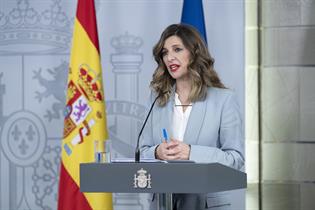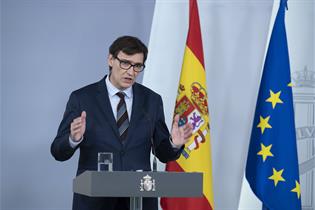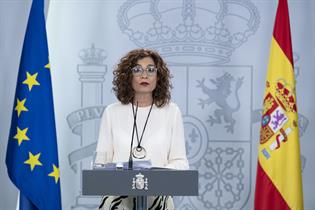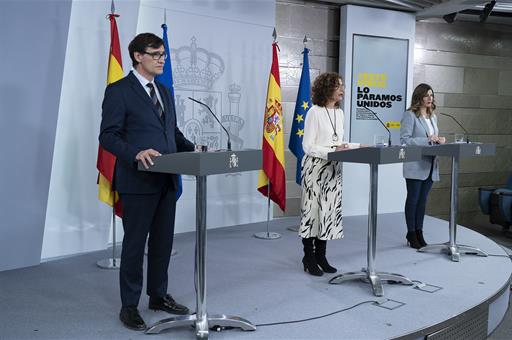Extraordinary Council of Ministers. Coronavirus COVID-19.
Government extends state of emergency to 11 April and approves new employment measures in response to COVID-19
Council of Ministers - 2020.3.27
Moncloa Palace, Madrid
The Council of Ministers approved the Royal Decree extending the state of emergency declared on 14 March, and the validity of the measures contained therein until midnight of 12 April 2020. The text also includes a new provision whereby the government will inform the Lower House every week of the measures adopted to contain the virus COVID-19 and assess their efficacy.
The Minister for the Treasury and Government Spokesperson, María Jesús Montero, stressed that the effort to remain a further 15 days in lockdown is "essential" to contain the spread of the virus, halt its expansion and gain time so that the health system "can maintain its capacity to provide a healthcare response and is able to attend to all those people who are sick".
María Jesús Montero stated that society must remain strong, civic-minded and supportive, as it has been and comply with these measures, "because if we act on a united front and each perform our own role with responsibility and efficacy, then we will come out of this crisis quicker".
Government will prevent dismissals justified by COVID-19
The government adopted a Royal Decree-Law with complementary employment measures to alleviate the effects of the COVID-19 health crisis.
The new legislation completes, specifies and strengthens the application and control mechanisms of the measures implemented through Royal Decree-Law 8/2020, of 17 March. The initiative offers greater cover and establishes specific measures for some sectors. Furthermore, it seeks to speed up public procurement during the crisis caused by the coronavirus.
The Minister for Work and Social Economy, Yolanda Díaz, reiterated that "the government will not leave anyone behind" and, with this aim in mind, agreed an "ambitious raft of social measures", on Friday.
It is not necessary to dismiss anyone
 Pool Moncloa/Borja Puig de la BellacasaDuring the press briefing, the minister stressed that no-on may take advantage of the health crisis to dismiss workers.
Pool Moncloa/Borja Puig de la BellacasaDuring the press briefing, the minister stressed that no-on may take advantage of the health crisis to dismiss workers.
The legislation approved on Friday, she underlined, establishes legal mechanisms and huge public resources so that business owners can use temporary employee lay-off plans (Spanish acronym: ERTE) and thus guarantee that these contracts are maintained. In this regard, dismissals cannot be justified on grounds of force majeure, or on technical, economic, organisational or productive grounds.
Temporary employment contracts, she clarified, are not extinguished, but rather interrupted, and will be resumed once the health crisis is over. "It is not necessary to dismiss anyone in our country. This crisis is a temporary situation and we feel that there are enough mechanisms so that between us all we can use public assets responsibly".
Yolanda Díaz also announced that the ERTEs will be simplified. Companies will only have to fill in a form with the personal details of the worker, their National Identity Documents and their account number. The public employment service offices will quickly process and recognise unemployment benefits. These benefits, clarified the minister, will even be granted to those people who have not made the usual number of prior contributions.
The minister also announced that the Work and Social Security Inspectorate will revise all the ERTEs ex officio, will verify the grounds alleged to apply for them and, in the event of applications that are false or incorrect, or if any type of fraud is uncovered, "they will have to return every last cent received, including the unemployment benefit paid to the worker affected".
The Minister for Work acknowledged the attitude of the public to this crisis, the work of the health personnel, the work being done by employees of the State Public Employment Service (Spanish acronym: SEPE), which was strengthened with an additional 1,000 members of staff, who "are doing piecework".
Stabilisation of pandemic
 Pool Moncloa/Borja Puig de la BellacasaThe Minister for Health, Salvador Illa, explained that we are still in the first phase of the fight against this epidemic, which consists of turning the corner on the rising number of infections, and also acknowledged the exemplary effort being made by the public at large and the huge job done by the healthcare professionals to beat the virus.
Pool Moncloa/Borja Puig de la BellacasaThe Minister for Health, Salvador Illa, explained that we are still in the first phase of the fight against this epidemic, which consists of turning the corner on the rising number of infections, and also acknowledged the exemplary effort being made by the public at large and the huge job done by the healthcare professionals to beat the virus.
Salvador Illa claimed that some of the recent figures show that we are close to reaching the maximum number of people infected and thus of starting a stabilisation phase, although he reiterated that it is necessary to remain cautious.
The government, he claims, continues to work hard and with all available resources, to acquire the products and material necessary to combat the coronavirus. In this regard, he announced that the government has signed off on contracts for a value of 578 million euros to purchase material.
Salvador Illa announced that the government will offer information each day on the material distributed to the regional health authorities. At today's date, he said, 7,433,000 face masks have been dispersed. As regards diagnostic tests, Salvador Illa pointed out that 650,000 units will soon arrive that meet all the "quality standards". The shipment initially acquired through a usual supplier, and which, in principle, complied with the requirements, did not attain the required level of reliability, as was observed when the first 50,000 units reached Spain, which were not handed out.
The minister also recalled that, in parallel, the government is organising, optimising and extending national production of protective equipment, diagnostic tests and assisted breathing apparatus.
Spain calls for international unity and coordination
 Pool Moncloa/Borja Puig de la BellacasaThe Government Spokesperson stressed that unity and coordination are key elements for combating the pandemic and its effects, at both a national and an international level. "This crisis will not be resolved if each country decides to act on its own".
Pool Moncloa/Borja Puig de la BellacasaThe Government Spokesperson stressed that unity and coordination are key elements for combating the pandemic and its effects, at both a national and an international level. "This crisis will not be resolved if each country decides to act on its own".
In Spain, María Jesús Montero highlighted the coordinated work by all the public authorities and announced that the President of the Government, Pedro Sánchez, will hold his third meeting by video-conference on Sunday with the regional presidents. She also expressed her gratitude for the solidarity shown by the National Health System to the regional governments that are suffering the worst effects of the pandemic, such as the Regional of Madrid.
At an international and a European level, the minister referred to the two meetings, of the G-20 countries and of the European Council, that the President of the Government, Pedro Sánchez, took part in on Thursday.
"The Government of Spain, together with other European governments, demands a clear, forceful and effective response from the European Union on medium- and long-term financing to address the socio-economic impact of the health crisis", explained María Jesús Montero, who regretted that the necessary consensus was not achieved on this matter. The Heads of State and Government of the European Union have agreed to meet again in two weeks' time.
María Jesús Montero expressed her confidence in an agreement being reached, to which end Spain will work "tirelessly", she said. The Government Spokesperson declared that our citizens "would never forgive" the European Union turning its back on this health emergency, and stated that the same mistakes made after the financial crisis in 2008 must not be repeated, which caused "disaffection and division" with the European project, which must continue to be "synonymous with solidarity and well-being".
Non official translation





